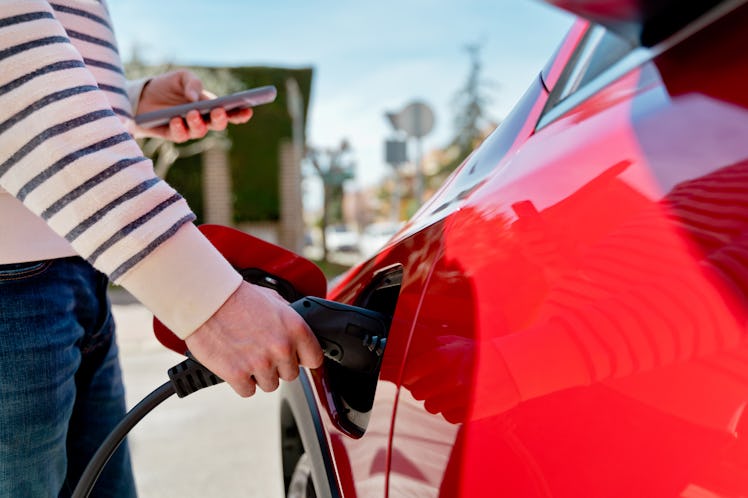That $7,500 EV Tax Credit Gets Way More Restrictive After April 18th
If you’re looking to buy an electric vehicle and want to take full advantage of the federal tax credit, you better get moving.

Last year, the Biden Administration announced the Inflation Reduction Act (IRA), the first major climate legislation in American history. The act was filled with funding for green energy projects, many of which hit taxpayers’ wallets directly. Among the pages and pages of new laws were tax incentives for the purchase of electric vehicles.
The EV regulations in the IRA, which provide a tax credit of up to $7,500 for the purchase of a new electric vehicle and are loaded with new final assembly and battery rules, were originally slated to go into effect at the beginning of 2023. However, that date has been pushed back by months — and now car owners have just a few more weeks to buy an electric vehicle if they want to take advantage of slightly more relaxed rules on what will, and won’t, qualify for the federal tax credit.
What Are The Inflation Reduction Act EV Tax Credit Rules?
The Inflation Reduction Act rules, which were slated to go into effect at the beginning of 2023, changed what EVs would qualify for the EV tax credit.
Under the IRA rules, the final assembly of the vehicle must take place in the United States, and only cars that cost below $55,000 and trucks, vans, and SUVs below $80,000 would be eligible for the tax credit.
Additionally, only single buyers who earn less than $150,000, married buyers who earn less than $300,000, and head of household buyers who earn less than $225,000 would be eligible for the credit.
Although those eligibility requirements are fairly straightforward, the more challenging part of the new legislation for vehicle manufacturers is the legislation mandating battery components and critical minerals makeup.
For 2023, at least 50% of the value of the battery’s components must be made or assembled in North America. That percentage rises to 60% in 2024 and 2025, 70% in 2026, 80% in 2027, and 90% in 2028.
As for critical minerals, starting in 2023, at least 40% of the critical minerals used in battery manufacture — including nickel, lithium, manganese, cobalt, and graphite — must be mined, refined, or recycled in the U.S. or a U.S. free trade partner. The percentage rises to 50% in 2024, 60% in 2025, 70% in 2026, and 80% after 2026.
When Do The New EV Tax Credit Rules Take Effect? What Vehicles Will Qualify?
All of these rules were slated to take effect on Jan. 1, 2023, but the Treasury Department needed extra time to determine the most efficient and effective way to implement the battery and critical minerals rules and pushed implementation out to March. In simple terms, you can still buy an EV that might not qualify under the new rules over the next few weeks — before April 18th — and claim your tax credit on your taxes.
Late last week, the Treasury Department announced that it had nailed down the rules for determining which EVs will be eligible under the new battery rules, but it is up to the manufacturer to let the IRS know which of its models meet the criteria. As of yet, there is no official list of qualifying vehicles, and that list will also be published on April 18th.
The Treasury Department’s list of specifications for qualifications is basically a detailed backstory for batteries and battery components, including where the components came from, how much of each component came from where, and the relative value of each of those components compared to the value of the battery itself.
They also added that EVs with batteries or minerals sourced from a “foreign entity of concern” will not qualify after 2025 — although they have not yet listed which entities are considered entities of concern.
However, the Treasury Department named a preliminary list of countries with U.S. free trade agreements that could provide critical minerals for EVs and have them still qualify. These include Australia, Bahrain, Canada, Chile, Colombia, Costa Rica, Dominican Republic, El Salvador, Guatemala, Honduras, Israel, Japan, Jordan, Korea, Mexico, Morocco, Nicaragua, Oman, Panama, Peru, and Singapore. Officials said the list would change over time.
Can I Still Buy An EV And Get My Tax Credit? When Is The Deadline?
If you bought an EV you thought qualified during the first quarter of the year, don’t worry. The new regulations and requirements will not impact your ability to claim your tax credit.
The limitations will apply to EVs that are purchased after April 18th, 2023. On that date, a new list compiled by auto manufacturers will be released of which EVs qualify under the new battery and critical mineral rules. Stay tuned for that.